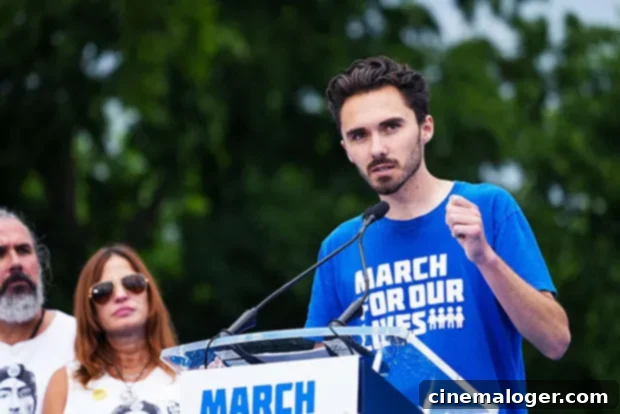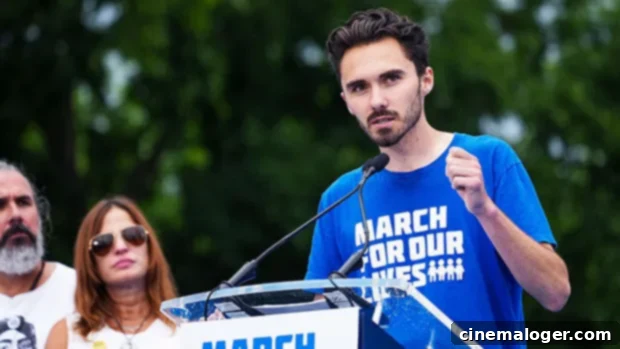David Hogg Confronts Lawmakers: US-Sourced Guns Fuel Violence, Not Mexico, Demanding Assault Weapon Ban
In a powerful and unscripted moment that underscored the urgent debate on gun control in America, Parkland school shooting survivor David Hogg directly confronted Republican lawmakers during a House Judiciary Committee hearing. On Wednesday, July 20, 2022, the 22-year-old co-founder of March For Our Lives interrupted proceedings, vehemently calling out politicians for their perceived inaction on regulating assault weapons and addressing gun violence. His impassioned outburst, asserting that the instruments of mass casualty originate domestically and not from external sources like Mexico, led to his forceful removal from the hearing room, but not before his message resonated loudly, echoing the frustrations of countless gun control advocates across the nation.
Hogg, a voice forged in the crucible of tragedy at Marjory Stoneman Douglas High School in 2018, seized the opportunity to lambast lawmakers who he believes are beholden to powerful gun lobbyists. His intervention occurred during a critical committee meeting convened to deliberate a potential nationwide ban on assault weapons, a proposal that has gained renewed traction following a spate of horrific mass shootings. With unwavering conviction, Hogg specifically highlighted the insidious motives often driving these perpetrators, pointing out the distressing reality that many firearms used in such atrocities are obtained through legal channels within the United States. His defiant challenge to the status quo brought the often-abstract legislative discourse into sharp, painful focus, making it clear that the lives lost are a direct consequence of systemic failures and political gridlock.
The guns in Parkland, Buffalo, El Paso, didn’t come from Mexico. They came from the US, and the shooters were inspired by racist, anti-black, anti-immigrant manifestos that rhyme with GOP talking points. pic.twitter.com/0D4QbHvu1t
— David Hogg ☮️ (@davidhogg111) July 20, 2022
During his spontaneous address to the committee, Hogg meticulously deconstructed the origins of the violence, stating, “The shooter at my high school: antisemitic, anti-Black and racist. Guess what? Those guns are coming from the United States of America. They aren’t coming from Mexico. They are not coming from Mexico.” He emphatically refuted narratives that seek to externalize the problem, directly accusing a lawmaker, “You are re-iterating the points of a mass shooter, sir. Sir, you are perpetuating violence.” This direct accusation cut through the usual political decorum, highlighting his belief that certain political rhetoric inadvertently fuels the very ideologies that inspire mass violence. His words served as a stark reminder that the discussion around gun control must address not only the availability of weapons but also the hateful ideologies that precede their use, which he argued are often amplified by political discourse.
Following his dramatic exit from the hearing, Hogg reiterated and expanded upon his crucial points in a widely shared tweet accompanying the video of his outburst. He specifically referenced some of the most devastating recent mass shootings in the United States, writing, “The guns in Parkland, Buffalo, El Paso, didn’t come from Mexico. They came from the US, and the shooters were inspired by racist, anti-black, anti-immigrant manifestos that rhyme with GOP talking points.” This statement is profoundly significant as it directly challenges a common political talking point that often deflects blame for domestic gun violence towards border security issues. By firmly grounding the origin of these weapons within the U.S. and linking the shooters’ motives to specific forms of hatred that he suggested were echoed in Republican rhetoric, Hogg framed gun violence as an inherent American problem requiring American solutions, rather than an imported one. His analysis demands that lawmakers confront the internal factors contributing to these tragedies, from weapon accessibility to the spread of extremist ideologies.

Hogg’s activism extends beyond legislative hearings and social media. He also shared another video detailing an encounter where an individual attempted to film and bait him into a contentious debate about gun control laws. In a clever maneuver to counteract the harassment and prevent the spread of potentially misleading content, the activist played music loudly, hoping to trigger a copyright strike against the video and force its removal from online platforms. This incident, and Hogg’s reaction, highlighted the often-hostile environment faced by gun control advocates. In his accompanying tweet, he eloquently articulated the disparity in motivations between activists and the gun lobby: “Gun lobbyists can try & birddog us, stop us, yell at us. The difference between us & them is we’re just young ppl defending our right to live. They’re defending weapons of war and their bank [accounts].” This stark contrast underscores the fundamental ethical divide, positioning the activists as defenders of human life and the lobbyists as protectors of profit and military-grade weaponry.
David Hogg’s journey into national activism began tragically as a survivor of the devastating 2018 shooting at Marjory Stoneman Douglas High School in Parkland, Florida, an event that claimed 17 lives. In the ensuing years, he has emerged as one of the most prominent and articulate voices in the gun reform movement. His commitment to preventing future tragedies remains unwavering, as he continues to champion legislative changes and share vital information about gun safety and reform initiatives. His advocacy has been central to the March For Our Lives movement, which he co-founded with fellow Parkland survivors. This youth-led organization has been instrumental in organizing protests, voter registration drives, and lobbying efforts to push for common-sense gun laws, including universal background checks, bans on assault weapons, and red flag laws. Hogg consistently utilizes his platform to empower others, frequently sharing resources from March For Our Lives to inform the public on how they can actively participate in the movement and contribute to the ongoing fight for safer communities.
The core of Hogg’s message—that guns used in mass shootings are predominantly sourced within the United States—directly challenges a prevailing narrative that often seeks to shift blame or complicate solutions. By emphasizing that weapons like those used in Parkland, Buffalo, and El Paso are legally acquired domestically, he points to a critical failure in current U.S. gun laws. The repeated assertion that these weapons are “not coming from Mexico” serves to redirect focus back to internal policy decisions and the political will, or lack thereof, to enact meaningful reform. This perspective compels lawmakers to acknowledge their direct responsibility in addressing a crisis that is fundamentally homegrown, requiring robust legislative action rather than diversionary tactics.
Furthermore, Hogg’s explicit connection between the racist and xenophobic manifestos of mass shooters and “GOP talking points” highlights a more uncomfortable dimension of the gun violence debate. He argues that certain political rhetoric inadvertently legitimizes or inspires the hateful ideologies that often precede violent acts. This assertion pushes the conversation beyond mere policy proposals to examine the broader cultural and political environment that can either mitigate or exacerbate domestic extremism and its deadly consequences. It suggests that comprehensive solutions to gun violence must also involve a critical assessment of public discourse and a commitment to de-escalating divisive language that can be misinterpreted or weaponized by those prone to violence.
The push for an assault weapons ban, a central theme of the House Judiciary Committee hearing Hogg interrupted, remains a cornerstone of the March For Our Lives agenda and many other gun control advocacy groups. Such bans aim to restrict the sale and ownership of military-style firearms designed for rapid, high-casualty engagements, arguing that these weapons have no place in civilian hands. Proponents point to the devastating effectiveness of these weapons in mass shootings, where their high capacity and rapid firing capabilities amplify fatalities. While the debate surrounding assault weapons is complex and deeply entrenched in Second Amendment interpretations, Hogg’s activism consistently reinforces the human cost of their widespread availability, urging lawmakers to prioritize public safety over unrestricted access to instruments of war. His steadfast commitment to this cause ensures that the voices of survivors and victims continue to be heard, demanding accountability and tangible change from those in power.
In conclusion, David Hogg’s courageous confrontation with lawmakers on the House Judiciary Committee was more than just an interruption; it was a potent reminder of the urgent, deeply personal stakes involved in the gun control debate. His unwavering advocacy, rooted in his own harrowing experience, continues to underscore critical truths: America’s gun violence crisis is largely an internal issue fueled by domestically sourced weapons, and effective solutions demand an assault weapons ban, accountability from politicians, and a critical examination of the rhetoric that can inspire hateful acts. Through his activism with March For Our Lives, Hogg not only educates the public but also mobilizes a generation of young people determined to transform the landscape of gun safety, demonstrating that persistent, passionate advocacy is crucial in the ongoing fight for a safer nation. His actions serve as a powerful call to action for every citizen and legislator to engage earnestly in addressing this pressing national tragedy.
